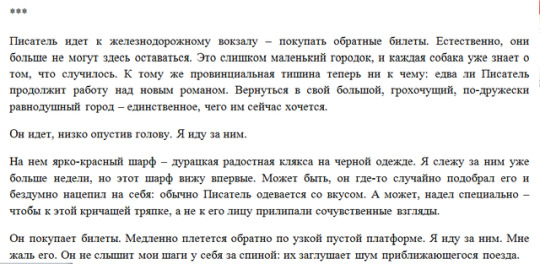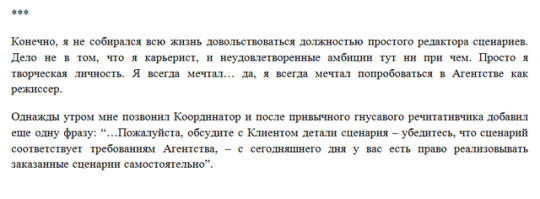#амб��р
Explore tagged Tumblr posts
Photo


The Agency XI
Писатель идёт к железнодорожному вокзалу – покупать обратные билеты.
The writer is going to the railway station to buy return tickets. Идёт is a third person present imperfective form of идти, and it’s an equivalent of Present Continuous and means “right now”.
Естественно, они больше не могут здесь оставаться. Это слишком маленький городок, и каждая собака уже знает о том, что случилось.
Obviously, they can’t stay here anymore. This town is too small, and every dog already knows what has happened. “Каждая собака знает” is a common phrase to express that something is known to everyone.
К тому же провинциальная тишина теперь ни к чему: едва ли Писатель продолжит работу над новым романом.
Besides, the provincial stillness is not needed anymore: The writer will hardly continue his work on the new novel. К тому же - besides, in addition. Тишина is silence, but talking about suburbia silence has a broader connotation like eventlessness, so I chose the word stillness. Ни к чему - worthless, has no meaning. Едва ли - hardly. Работа над - work on something.
Вернуться в свой большой, грохочущий, по-дружески равнодушный город – единственное, чего им сейчас хочется.
To return to their big, rambling and indifferent in a friendly way city is the only thing they want right now. Words with prefix по- become adverbs, so по-дружески is friendly, but we also have an adverb ‘дружелюбно’ that’s closer to kind attitude, the antonym of “hostile”, and по-дружески is acting like friends act. “Им хочется” is an impersonal construction with a reflexive verb that can be translated as “they would like” which is almost the same as “they wanted”.
Он идёт, низко опустив голову. Я иду за ним.
He is walking lowering his head. I’m following him. Идёт and иду are present tense verbs meaning Present Continuous “I’m walking”. Низко опустить translates like “to lower low” so I omitted the adverb in the translation to avoid repetition. “Идти за...” is literally “to go behind” which is actually to follow.
На нём ярко-красный шарф - дурацкая радостная клякса на чёрной одежде.
He’s wearing a bright red scarf, a stupid cheerful blot on black clothes. на нём = on him, so it’s “on him is a bright red scarf”. На чёрной одежде - Prepositional. Дурацкий can be translated as “stupid” when we speak about things and not people because stupid with people means “not clever” and the Russian word does not have such meaning.
Я слежу за ним уже больше недели, но этот шарф вижу впервые.
I’m spying on him for more than a week already, but I see this scarf for the first time. следить is also “to watch”, “follow”, “monitor”. “Spy” is maybe a too strong word here because the actual “spy” is “шпионить”. Both used with a preposition “за” as all the verbs of this semantic field. Недели is a singular Genitive because after больше or меньше we use Genitive.
Может быть, он где-то случайно подобрал его и бездумно нацепил на себя: обычно Писатель одевается со вкусом.
Maybe he accidentally picked it up somewhere and mindlessly put it on himself: The Writer usually dresses with taste. бездумно - adv. that means to do something without any thought behind it. “Нацепить” is a quite colloquial word that has a sense of neglect or irritation and here it’s used to express the narrator’s attitude of the scarf that he doesn’t like. The neutral word for “to put on” - “надеть”. “Одеваться со вкусом” is a phrase worth learning by heart.
А может, надел специально - чтобы к этой кричащей тряпке, а не к его лицу прилипали сочувственные взгляды.
And maybe [he] put in on on purpose, so that the sympathetic looks sticked to this flashy rag and not his face. I had to change the word order completely. Flashy, clamorous clothes is called “кричащая одежда” which is “shouting clothes” because it draws attention. In English, a look can’t stick as far as I know, but in Russian it sounds okay - “взгляд прилип”, so you can’t take your eyes off something. Here the narrator means the looks of random people in the streets.
Он покупает билеты. Медленно плетётся обратно по узкой пустой платформе.
He’s buying the tickets. Slowly trails back down the narrow empty platform. Плестись is to walk very slowly and lazily. “По узкой пустой платформе” - Dative because we always use dative after “по”.
Я иду за ним. Мне жаль его. Он не слышит мои шаги у себя за спиной: их заглушает шум приближающегося поезда.
I’m following him. I’m sorry for him. He can’t hear my steps behind his back, the noize of the approaching train muffles them. “У себя за спиной” is a similar construction to what I tried to explain here. By him, behind the back literally.
Конечно, я не собирался всю жизнь довольствоватья должностью простого редактора сценариев.
Of course, I wasn’t going for the rest of my life to be satisfied with the position of an ordinary script editor. Довольствоваться + Instrumental = to be satisfied with smth.
Дело не в том, что я карьерист, и неудовлетворённые амбиции тут не при чём.
It’s not that I’m a careerist, and the unsatisfied ambitions have nothing to do with it. It’s quite a Russian sounding phrase. “Дело в том/Дело не в том, что...” + the point is (not)”. “Nominative + тут ни при чём” = “Smth has nothing to do with it”.
Просто я творческая личность. Я всегда мечтал... да, я всегда мечтал попробоваться в Агентстве как режиссёр.
I’m just a creative person. I’ve always dreamed... yes, I’ve always dreamed to try myself in the Agency as a director. Попробовать = to try, попробоваться = to try myself. Usually said about a new activity.
Однажды утром мне позвонил Координатор и после привычного гнусавого речитативчика добавил ещё одну фразу:
One morning the Coordinator called me and after the usual nasal recitative added one more phrase:
“...Пожалуйста, обсудите с Клиентом детали сценария - убедитесь, что сценарий соответствует требованиям Агентства, - с сегодняшнего дня у вас есть право реализовывать заказанные сценарии самостоятельно“.
“Please, discuss the details of the script with the Client, make sure that the script meets the requirements of the Agency, from today you have a right to implement the ordered scripts yourself“. Убедитесь, что = make sure that (in Вы form). Соответствует требованиям + Genitive = Meets the requirements of. Сегодняшний день is a long (beurocratic) form of “today”.
Previous part The beginning of the story
6 notes
·
View notes